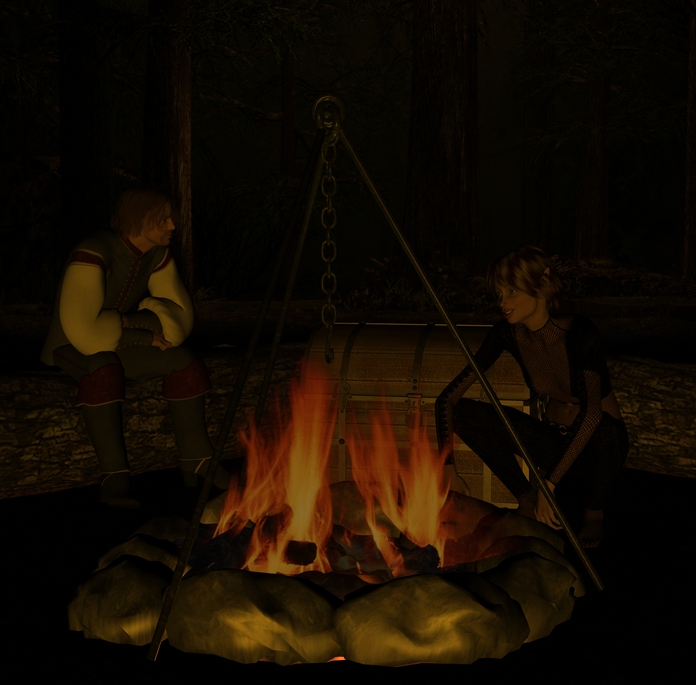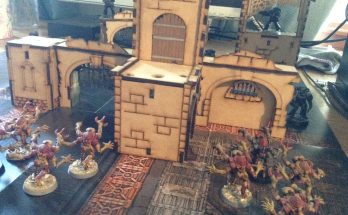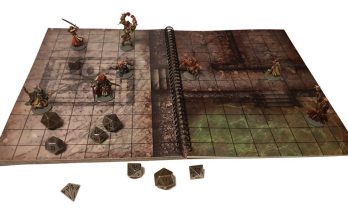Resting is an important part of Fourth Edition D&D with everything from catching your breath mid-combat (Second Wind), taking stock after the battle (Short Rests) and setting up camp for the night (Extended Rests) given relevance and meaning in the rules.
With all these campsites setting up, anyone got suggestions how we could find role-playing potential in them beyond the obvious rolling for a random encounter as soon as the bedrolls hit the ground? I’m thinking non-strenuous Skill Challenges, sharing the loot, NPC rivalries surfacing, strange noises and other elements that could make a night in the forest more exciting and mean it’s not just skipped over by the GM every single time. A Random Non-combat Encounter Table, if you will.
Suggestions?
Because firelight and treasure chests go so well together. Clicky biggee.





Tasks might include Pitching Tents, Starting Campfire, Preparing Supper. Tables for random events could include Weather, Insects, etc. Rain can be a big deal when you’re trying to live outdoors.
During an early session, you could ask everyone to agree on a default sleeping arrangement, who shares a tent, does the wizard cast an “alarm” ritual, who prepares supper, etc. Rather than going through the motions every time, you could ask everyone whether they are doing anything different. If they are deep in orc country, pcs might sleep in armor, cast defensive rituals, etc.
I really like the idea of having a “divide the loot” scene around the campfire.
Patriarch917s last blog post..The Lawful Good Dungeon Master
@Patriarch917 That’s exactly the kind if things I’m looking for, yep. Thanks!
My players typically use extended rests for roleplaying.
I don’t agree with using skill challenges, at least in standard situations. They’re adventurers; it’s trivial for them to pitch a tent or cook dinner, unless they’re in the middle of a hurricane or something. Save the dice-rolling for the important things.
Occasionally I’ll toss in an encounter of some sort, to keep them on their toes. But I don’t do it often. It bogs down the game, if every time they take a break they go investigate a weird noise or spend a couple of minutes debating the meaning of those three birds that flew by as they put the cookpot on. I don’t do that sort of thing only when it’s actually a plot point, because that’s a dead giveaway, but I don’t throw it in every time, either. A brief mention of the weather conditions and any typical noises serves just fine.
Scotts last blog post..Battlegrounds: Alchemist’s Lab
Give XP and only allowing division of loot during camping/extended rest when they have time to actually bother with such things.
I’m sometimes surprised on how my players don’t know the standard rituals of camping, i.e, pitching tents, setting up a campfire, gathering firewood or foraging, setting watch etc.
Questing GMs last blog post..Questing GM taking an Extended Rest
I think that skill checks each time they stop and rest are not really a good idea.
If they have to do the same things every time, not only will those things become routine for the characters, more importantly they will become boring for the players.
I do think that having a few specific skill challenges associated with camping is a good idea – but it shouldn’t relate to the routines of camp. But possible loot determination (I’m not a big fan of the fact that the players can automatically identify what a magic item does during a rest. Maybe that should be a skill challenge involving flat out testing of the item, mixed with Arcana, Religion or History. More like old school trial and error identification than the modern Identify spell.
On a tangential note, what I have been playing with is a turning overland travel in general (including resting) into a skill challenge.
My first iteration (I’m not entirely happy with it, but haven’t worked out the next approach yet) went something like this:
Skill Challenge
Three Parts
Part One: Finding the route and avoiding backtracking; Avoiding encounters. Each member of the party rolls once on the skill of their choice (Primary Skills: Nature, Stealth, Perception, History)
Group Success/Failure determines whether the party gets lost, the likelihood of random (non-plot) encounters and the DC for the second part. Note: Next time, I may break this up into three separate sections with the party deciding how to divide their one roll each among the three separate goals.
Part Two: Endurance Checks. DC varies between 5 and 20 depending upon the results of Part One. Each character rolls, failure results in the loss of a healing surge.
Part Three: Finding a safe place to rest/ setting up camp. Each party member rolls the skill of their choice (Primary Skills: Nature, Perception, Stealth). Group Success means that the party finds an appropriate place to rest and regain dailies, etc.
Carl
@Carl I agree – every time they set camp would be a bit much :) But a little campfire action now and then would be great. Think of any classic Western movie and there’s always at least one scene around the campfire. I’d love to be able to capture that in my gaming.
I like the idea of using Skill Challenges for Overland Travel and done something similar to this myself. Worth fleshing out as a blogpost, methinks.
And I’m thinking hard about saving up the sharing out the treasure until the next extended rest (unless there’s something particularly shiny and eye-catching in there!). Love that!
Thanks, all. Keep ’em coming!